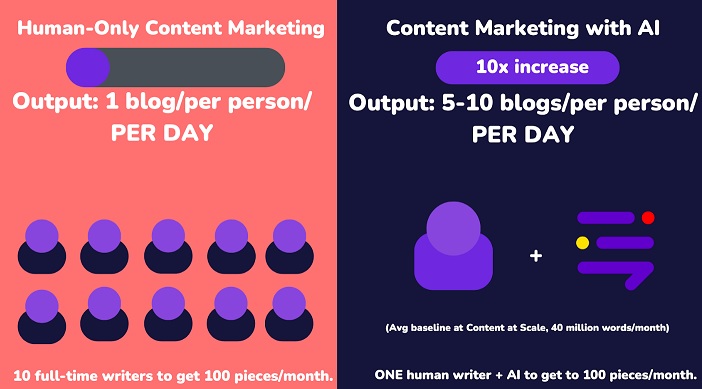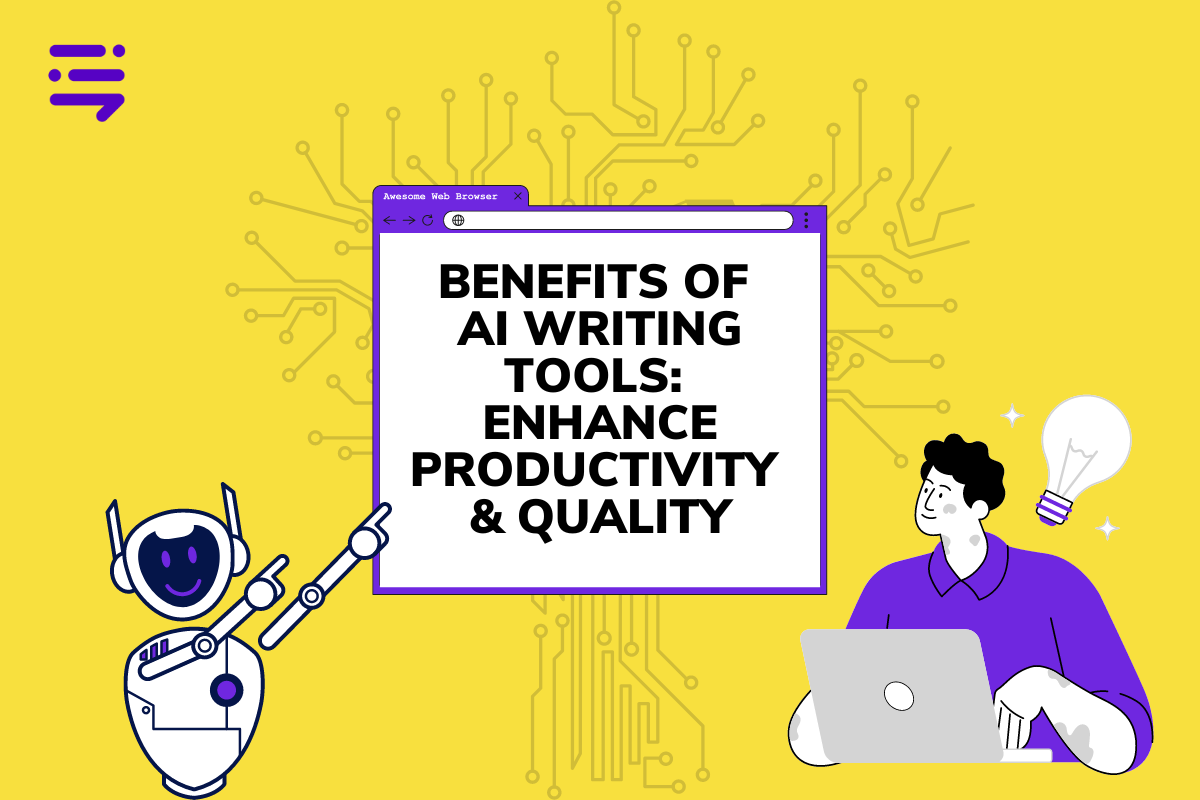The world of content creation is rapidly changing, and the benefits of AI writing tools are becoming impossible to ignore. These powerful tools use artificial intelligence to help writers generate ideas, refine their writing, and produce content quickly and efficiently.
Whether you’re a seasoned pro or a newbie author, these AI-powered tools can give you a significant advantage.
Let’s explore how the benefits of AI writing tools can improve your productivity, creativity, and output quality.
Table Of Contents:
- How AI Writing Tools Work: A Behind-the-Scenes Peek
- What Are The Benefits of AI Writing Tools?
- Limitations and Drawbacks of AI Writing Tools
- The Human-AI Collaboration
- Addressing the Ethics of AI Writing
- FAQs: Benefits of AI Writing Tools
- Conclusion
How AI Writing Tools Work: A Behind-the-Scenes Peek
Imagine feeding a machine a massive library of text and code and then training it to learn how humans use language.
That’s how AI writing tools were born. They use sophisticated algorithms, often powered by machine learning and natural language processing (NLP), to generate human-quality text.
ChatGPT is a popular AI writing tool that exemplifies these capabilities, crafting coherent and grammatically correct passages like a seasoned writer.
This smart chatbot analyzes massive datasets to predict the most likely word or phrase to follow in a sentence, helping create original content.
What Are The Benefits of AI Writing Tools?
Beyond speed and efficiency, there are many advantages of using AI writing tools.
1. Do More in Less Time
Cut down the time you’d normally spend researching and writing content – thanks to the time-saving advantages of artificial intelligence writing tools.
Like a trusted writing assistant, AI can help you dig deep into a topic, write compelling introductions, or even generate different content outlines to get those creative juices flowing.
Imagine needing to research and write a blog post about fixing a car — a topic that you’re completely unfamiliar with. An AI writing tool could help you quickly pull together key facts and figures, freeing you up to focus on the more analytical or creative aspects of your writing.
This translates to reduced time spent on tedious tasks, leaving you with more time to refine your ideas and focus on what matters – engaging your audience.

2. Write Better
Even the most seasoned writers make mistakes. AI writers, acting as vigilant editors, can spot those pesky grammatical errors and offer real-time suggestions for improvement.
Artificial intelligence can even learn your specific writing style, helping maintain consistency across your work and making blog posts feel more on-brand.
If you’re using Content at Scale, you can do this by feeding the AI up to three samples of your work — essentially “training” it to learn your writing tone and style.
To access this feature, go to your Project Settings and click the “AI Training” tab.
Here you can submit two samples each for the Introduction and Content sections.
Click the AI Evaluation button to see if the AI got your tone and style right.
After feeding your sample, the AI will now generate every blog post according to the way you write.
3. Break Down Language Barriers
With their advanced algorithms, AI writing assistants can translate your work into multiple languages, breaking down global communication barriers.
Businesses can create marketing campaigns, website copy, and support content tailored for a diverse, international audience.
4. Get Creative
Struggling with writer’s block? Join the club.
We’ve all been there. Staring for hours at a blank screen with a deadline looming.
AI writing can help here too. With access to billions of data points and the ability to identify patterns, AI content creation tools are excellent brainstorming buddies.
These tools help generate captivating headlines, explore different angles on a single topic, and even suggest fresh content formats like quizzes or interactive infographics.
5. Improve SEO
Some AI writers even go beyond basic grammar checks. They provide insights into content structure and readability and even suggest optimal keyword usage for better search engine optimization (SEO).
Just look at this full suite of SEO tools from Content at Scale:
While you are editing your AI-generated content, you’ll have access to:
- Dynamic SEO scoring
- SEO stats like the number of words, links, and images
- Real-time optimization audit
- An SEO checklist
- Plagiarism checker
- AI detector
- Keywords and entities with NLP salience scores
All these tools are right at your fingertips, ready to guide you in making your article rank well in search engines.
Limitations and Drawbacks of AI Writing Tools
Although AI content generators can help boost productivity, they do have limits.
AI writing tools are great for generating product descriptions or social media captions, but they lack emotional depth for creative content writing. Think of AI as a brainstorming partner. They’re great for basic tasks, but you wouldn’t want them to write your novel.
One big problem is that AI tools sometimes miss the nuances of human language. They might misunderstand sarcasm or humor. This can make the writing sound robotic and unnatural. This is a big deal because you want your writing to connect with real people.
Another issue is that AI tools often struggle with creativity and originality. Because they learn from existing data, they might create repetitive or formulaic content. Although this is helpful for some things, it doesn’t work for creating fresh and engaging content.
The Human-AI Collaboration
While the capabilities of AI in writing are undeniably impressive, it’s vital to acknowledge that these tools work best when they complement human writers, not replace them.
Think of AI as a tireless assistant, ready to handle repetitive tasks and polish your prose, freeing you up to infuse your unique voice, creativity, and critical thinking into the work. This human touch allows you to create content that is both high-quality and engaging.
Addressing the Ethics of AI Writing
The rise of readily available AI writers has also sparked some important conversations about their ethical implications.
As with any new technology, it is important to use AI writing tools responsibly and ethically.
Transparency and Authenticity
As a writer, it’s crucial to be transparent about when and how you use AI tools.
Disclosing AI involvement in research and content generation is essential for maintaining trust with your readers.
It’s always best to combine these technological insights with your human touch, avoiding the perception that your work is entirely machine-generated.
Remember, the aim is “AI-assisted” and not “AI-generated”.
Fact-Checking
Never accept anything generated by AI at face value. While these tools are incredibly helpful, they can sometimes get facts wrong, use outdated information, or misinterpret your instructions.
For example, an AI tool may tell you there are 700 million LinkedIn users, but thorough research will reveal that the number is now over 1 billion.
Keep in mind that AI tools are not perfect and can make mistakes. Always double-check any information that you get from an AI tool, and don’t be afraid to make manual corrections.
Plagiarism
Though designed to generate unique content, certain AI writing outputs might still run the risk of plagiarism. Some AI tools even scrape online content for information.
Google has strict guidelines against publishing plagiarized AI-generated content. So always run your AI-assisted work through plagiarism checkers for that extra peace of mind.
Content at Scale has developed its proprietary plagiarism checker tool that you can access from inside the app or on a standalone browser.
What makes this plagiarism scanner unique is its in-depth analysis and detailed reports. It will highlight the plagiarized content and indicate the source(s) from which the content was copied. The score also indicates which parts are identical, slightly similar, and unique — allowing you to easily identify and rewrite duplicate content.
FAQs: Benefits of AI Writing Tools
What are the benefits of AI writing?
AI writing offers increased efficiency by quickly generating content and enhances creativity by providing new ideas and perspectives.
How can AI help in writing?
AI can help in writing by suggesting content ideas, improving grammar and style, and generating text based on specific prompts, making the writing process faster and more efficient.
What are 5 advantages of AI?
- Enhanced efficiency and productive
- Improved accuracy and precise
- The ability to process and analyze large data sets
- 24/7 availability without fatigue
- Personalized user experiences through adaptive learning
What are the advantages and disadvantages of AI tools?
While AI tools are great for increasing efficiency and accuracy, they also require significant data for training, raise ethical and privacy concerns, and may lead to job displacement.
Conclusion
The increasing availability and sophistication of AI writing tools aren’t merely assisting content creation – they’re reshaping it.
AI writing tools will continue to redefine content creation, and learning how to use them strategically, ethically, and creatively opens a world of opportunities for anyone who writes — whether for marketing, creative pursuits, or everyday communication.
The benefits of AI writing tools are reshaping the content landscape — sparking innovation, improving efficiency, and streamlining workflows, ultimately allowing you, the human writer to take center stage.




